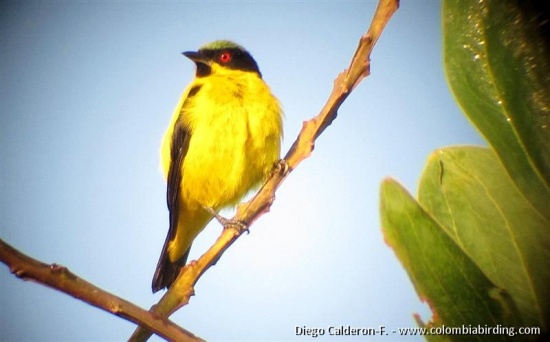(→Taxonomy: Update link) |
(Clearer image. Diet. References updated) |
||
| Line 1: | Line 1: | ||
| − | [[Image: | + | [[Image:Yellow-bellied Dacnis - Dacnis flaviventer - Mitu.JPG|thumb|550px|right|<br />Photo by {{user|COLOMBIA+Birding|COLOMBIA Birding}}<br />Mitu, south-western [[Colombia]], December 2011]] |
;[[:Category:Dacnis|Dacnis]] flaviventer | ;[[:Category:Dacnis|Dacnis]] flaviventer | ||
==Identification== | ==Identification== | ||
| Line 19: | Line 19: | ||
==Behaviour== | ==Behaviour== | ||
====Breeding==== | ====Breeding==== | ||
| − | The nest is a fragile open cup built of fern and spiderweb, lined with rootlets, dried grasses and moss woven together, placed in a fork of a tree. | + | The nest is a fragile open cup built of fern and spiderweb, lined with rootlets, dried grasses and moss woven together, placed in a fork of a tree. |
| + | ====Diet==== | ||
| + | Their diet consists of fruit, nectar and insects. | ||
==References== | ==References== | ||
| − | #{{Ref- | + | #{{Ref-Clements6thAug14}}#Avibase |
#Arthur Grosset | #Arthur Grosset | ||
| + | #Handbook of the Birds of the World Alive (retrieved November 2014) | ||
{{ref}} | {{ref}} | ||
==External Links== | ==External Links== | ||
Revision as of 19:39, 21 November 2014
- Dacnis flaviventer
Identification
Male:
- Yellow belly
- Red eye
- Black head with dull green on the crown and nape
Female:
- Olive brown upperparts
- Dull brownish-buff underparts
- Indistinct mottling on the throat and breast
Distribution
South America: found in south-eastern Colombia to southern Venezuela, Ecuador, Peru, northern Bolivia and western Amazonian Brazil.
Taxonomy
This is a monotypic species[1].
Habitat
Amazonian rain forests near rivers and subtropical or tropical swamps.
Behaviour
Breeding
The nest is a fragile open cup built of fern and spiderweb, lined with rootlets, dried grasses and moss woven together, placed in a fork of a tree.
Diet
Their diet consists of fruit, nectar and insects.
References
- Clements, J. F., T. S. Schulenberg, M. J. Iliff, D. Roberson, T. A. Fredericks, B. L. Sullivan, and C. L. Wood. 2014. The eBird/Clements checklist of birds of the world: Version 6.9., with updates to August 2014. Downloaded from http://www.birds.cornell.edu/clementschecklist/download/
- Avibase
- Arthur Grosset
- Handbook of the Birds of the World Alive (retrieved November 2014)
Recommended Citation
- BirdForum Opus contributors. (2024) Yellow-bellied Dacnis. In: BirdForum, the forum for wild birds and birding. Retrieved 16 April 2024 from https://www.birdforum.net/opus/Yellow-bellied_Dacnis




